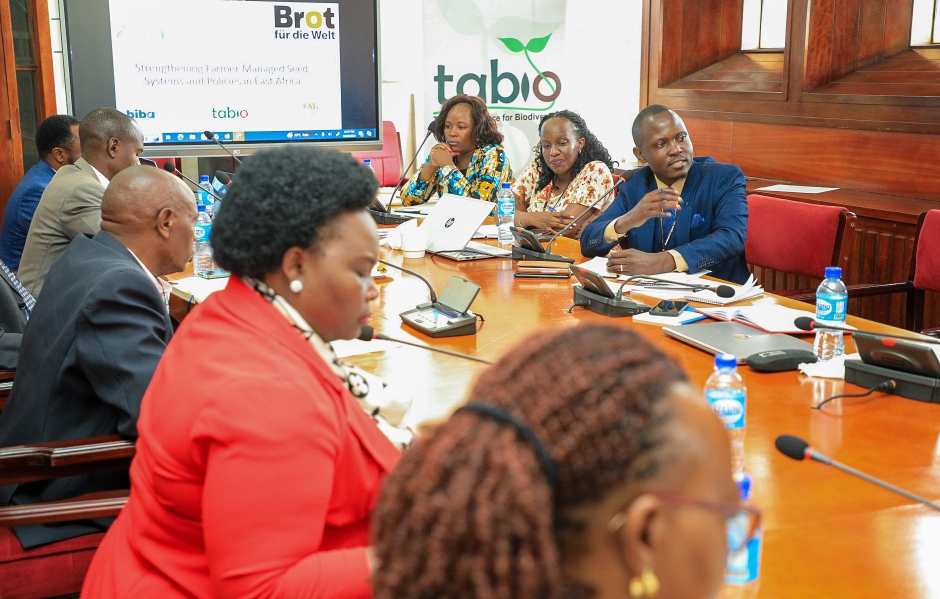News
CSOs want laws to protect indigenous seeds

SEATINI’s Herbert Kafeero meeting with EALA members meeting in Kampala Uganda October 2024
Civil society activists has asked Members of Parliament for the Easter African Community to make laws that will ensure protection of indigenous seeds in order to counter the challenges associated with hybrid or improved seeds.
Pro-Science activists have however allayed fears about loss of indegenous seeds by stating that there are adequate safeguards and laws to protect indegenous seeds.
Civil society activists say that the existing seed polices instead prioritize commercial seed systems while neglecting the specific needs and contributions of farmer-managed seed systems.
Presenting the findings of a study report entitled: “Building Farmer-managed seeds systems and preserving indigenous seeds in East Africa”, activists noted that the existing seed legalisations do not address the seed challenges faced by the small holder farmers.
Herbert Kafeero, the Programs officer at the Southern and Eastern Africa Trade Initiative (SEATINI) said that farmers in the region risk losing the indigenous seeds to the international bodies and risk relying on external inputs which are costly.
Kafeero wants the East African Legislative Assembly committee on Agriculture to have the Farmer Managed Seed Systems put into the regional laws, justifying that the system ensures a principle of source of seeds that is reliable, available and affordable.
He noted that the challenge at hand now is that hybrid and commercial seeds have permeated the communities adding that in a number of communities, farmers are depending on companies for seeds for the next season, but that dependence is very costly.
“It is compromising food security. We have interacted with farmers and they have told us that some of these seeds do not even yield and no one is liable. When farmers experience such losses, no one pays for the same. But we are talking about indigenous seeds they know better ones that have been resilient over centuries,” Kafeero stressed
Kafeero further says that because of lack of policies and laws on farmer-managed seed systems and indigenous seeds, big international seed companies have managed to get patents over the African seeds and animals at the expense of the African people.
Jonathan Lubega, the Programs Officer at SEATINI warned against the seed polices hinged on intellectual property rights as the agricultural sector is being commercialised, saying that such policies will extensively undermine the rights of the ordinary small holder farmers.
“The indigenous seeds still allow sharing, saving within the communities yet this is not allowed in the patenting regimes where seeds are seen as properties which can not be shared, can not be replanted as it is for our indigenous seeds,” Lubega noted
Whereas the lawmakers from the East African member states currently sitting Kampala, expressed the need to advocate for the indigenous seeds at the regional level.
Gideon Gatpan MP south Sudan Rutazana Francine MP Rwanda expressed concerns on how the farmer-managed Seed systems (FMSS) and indigenous seeds can contribute to the poverty eradication and also cater for mass food production in order to end hunger by 2030 as per Sustainable Development Goal number 2.
Franciose Uwumukiza, the chairperson, EALA committee on Agriculture, Tourism and Natural Resources says that the committee will write a report and submit it to the council of ministers which is also currently considering East African Seeds and plants bill.
Uwumukiza said as members they are still waiting for the council of ministers (the policy organ of the community) to introduce the “East African Seeds and Plant Bill” for them to legislate.
What we can do is to report what we have heard from Civil Society so that they can see whether they can prepare a policy quickly to legislate on the matter because seeds are important for us to have food on the table.
In response to fears from civil society organizations, scientists have allayed their fears by observing that the country has adequate systems and laws that protect indegenous seeds.
At national level for example, the country has a well stocked seed bank located at Entebbe for thousands of indegenous seeds that are accessible by farmers free of charge.
And at different national research institutes, the government promotes conservation of indegenous varieties not only for research purposes but also for distribution to farmers.
On the other hand however, proponents of improved seeds have accused the activists for spreading needles fear among the people for selfish ends.
Peter Wamboga-Mugirya, from the Science Foundation for Livelihoods and Development (SCIFODE) noted that what most people call indegenous seeds is in fact foreign and was introduced either by colonialists of was developed by Ugandan researchers many years ago.
“Those great bananas, pineapples, tomatoes, melons, cabbages, apples, oranges, mangoes beautifully lining those stalls in markets, and in photos occupying front-pages of glossy pamphlets, brochures, magazines, websites and videos about agriculture in Uganda, are not derived from indigenous seeds. It’s foreign (exotic) imported seed from Europe, N. America, Asia or Latin America. Even what we display as our cattle and other livestock, whose milk productivity government and championed by his excellence President Museveni, are not indigenous.
“And I can go on and on, to illustrate to you that the “indigenous” craze is just but a craze, a notion and very idealistic obsession that has no serious basis and it helps to give the activists something to coalesce around and having found loosely-hanging money of people [mainly Europeans] willing to rally around non-serious issues,”
Comments


















